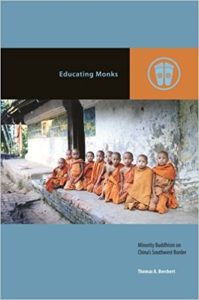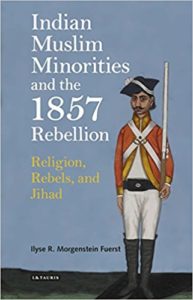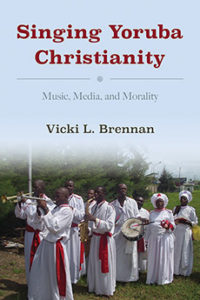Check out the recent books written by our faculty–and stay tuned for individual posts from these scholars!
Educating Monks: Minority Buddhism on China’s Southwest Border by Prof. Thomas Borchert (University of Hawaii Press, May 2017)

“Most studies of Buddhist communities tend to be limited to villages, individual temple communities, or a single national community. Buddhist monastics, however, cross a number of these different framings: They are part of local communities, are governed through national legal frameworks, and participate in both national and transnational Buddhist networks. Educating Monks makes visible the ways Buddhist communities are shaped by all of the above—collectively and often simultaneously.
Educating Monks examines a minority Buddhist community in Sipsongpannā, a region located on China’s southwest border with Myanmar and Laos. Its people, the Dai-lue, are “double minorities”: They are recognized by the Chinese state as part of a minority group, and they practice Theravāda Buddhism, a minority form within China, where Mahayana Buddhism is the norm. Theravāda has long been the primary training ground for Dai-lue men, and since the return of Buddhism to the area in the years following Mao Zedong’s death, the Dai-lue have put many of their resources into providing monastic education for their sons. However, the author’s analysis of institutional organization within Sipsongpannā, the governance of religion there, and the movements of monks (revealing the “ethnoscapes” that the monks of Sipsongpannā participate in) points to educational contexts that depend not just on local villagers, but also resources from the local (Communist) government and aid form Chinese Mahayana monks and Theravāda monks from Thailand and Myanmar. While the Dai-lue monks draw on these various resources for the development of the sangha, they do not share the same agenda and must continually engage in a careful political dance between villagers who want to revive traditional forms of Buddhism, a Chinese state that is at best indifferent to the continuation of Buddhism, and transnational monks that want to import their own modern forms of Buddhism into the region.”
Indian Muslim Minorities and the 1857 Rebellion: Religion, Rebels, and Jihad by Prof. Ilyse Morgenstein Fuerst (I.B. Tauris, 2017) 
“While jihad has been the subject of countless studies in the wake of recent terrorist attacks, scholarship on the topic has so far paid little attention to South Asian Islam and, more specifically, its place in South Asian history. Seeking to fill some gaps in the historiography, Ilyse R. Morgenstein Fuerst examines the effects of the 1857 Rebellion (long taught in Britain as the ‘Indian Mutiny’) on debates about the issue of jihad during the British Raj. Morgenstein Fuerst shows that the Rebellion had lasting, pronounced effects on the understanding by their Indian subjects (whether Muslim, Hindu or Sikh) of imperial rule by distant outsiders. For India’s Muslims their interpretation of the Rebellion as jihad shaped subsequent discourses, definitions and codifications of Islam in the region. Morgenstein Fuerst concludes by demonstrating how these perceptions of jihad, contextualised within the framework of the 19th century Rebellion, continue to influence contemporary rhetoric about Islam and Muslims in the Indian subcontinent.Drawing on extensive primary source analysis, this unique take on Islamic identities in South Asia will be invaluable to scholars working on British colonial history, India and the Raj, as well as to those studying Islam in the region and beyond.”
Singing Yoruba Christianity Music, Media, and Morality by Prof. Vicki Brennan (Indiana University Press, 2018)
 “Singing the same song is a central part of the worship practice for members of the Cherubim and Seraphim Christian Church in Lagos, Nigeria. Vicki L. Brennan reveals that by singing together, church members create one spiritual mind and become unified around a shared set of values. She follows parishioners as they attend choir rehearsals, use musical media—hymn books and cassette tapes—and perform the music and rituals that connect them through religious experience. Brennan asserts that church members believe that singing together makes them part of a larger imagined social collective, one that allows them to achieve health, joy, happiness, wealth, and success in an ethical way. Brennan discovers how this particular Yoruba church articulates and embodies the moral attitudes necessary to be a good Christian in Nigeria today.”
“Singing the same song is a central part of the worship practice for members of the Cherubim and Seraphim Christian Church in Lagos, Nigeria. Vicki L. Brennan reveals that by singing together, church members create one spiritual mind and become unified around a shared set of values. She follows parishioners as they attend choir rehearsals, use musical media—hymn books and cassette tapes—and perform the music and rituals that connect them through religious experience. Brennan asserts that church members believe that singing together makes them part of a larger imagined social collective, one that allows them to achieve health, joy, happiness, wealth, and success in an ethical way. Brennan discovers how this particular Yoruba church articulates and embodies the moral attitudes necessary to be a good Christian in Nigeria today.”
Theravada Buddhism in Colonial Contexts edited by Prof. Thomas Borchert (Routledge, 2018)
 “Over the course of the nineteenth century, most of the Theravada world of Southeast Asia came under the colonial domination of European powers. While this has long been seen as a central event in the development of modern forms of Theravada Buddhism, most discussions have focused on specific Buddhist communities or nations, and particularly their resistance to colonialism.
“Over the course of the nineteenth century, most of the Theravada world of Southeast Asia came under the colonial domination of European powers. While this has long been seen as a central event in the development of modern forms of Theravada Buddhism, most discussions have focused on specific Buddhist communities or nations, and particularly their resistance to colonialism.
The chapters in this book examine the many different colonial contexts and regimes that Theravada Buddhists experienced, not just those of European powers such as the British, French, but also the internal colonialism of China and Thailand. They show that while many Buddhists resisted colonialism, other Buddhists shared agendas with colonial powers, such as for the reform of the monastic community. They also show that in some places, such as Singapore and Malaysia, colonialism enabled the creation of Theravada Buddhist communities. The book demonstrates the importance of thinking about colonialism both locally and regionally.”
